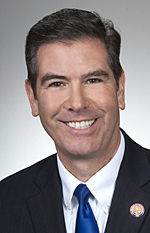Riedel: Regulatory reform needed
As the New Year begins, I would like to reflect on the interest the state legislature has shown in reducing unnecessary rules within our state agencies and future steps that will improve the overall business environment.

A study from November 2019 conducted by the Mercatus Center at George Mason University placed Ohio in the top 5 category of states with the most regulatory restrictions, along with California, New York, Illinois, and Texas. These restrictive regulations hurt small businesses and stifle our state’s economic growth. With over 246,000 restrictions built up over time, Ohio is going to have to take a more in-depth look at the bureaucratic structure of accumulating these regulations.
Last year, I voted in support of House Bill 166, our state’s main operating budget for Fiscal Years 2020-21, with preliminary steps to reduce regulatory restrictions through state agency review. Specifically, Section 701.10 in the budget bill requires designees from the Department of Administrative Services (DAS) and the Office of Budget and Management (OBM) to review the programs of state agencies in order to determine what overlap or duplicate functions exist.
As of January 1, 2020, the directors of DAS and OBM have taken the initial steps in reviewing state agencies’ functions with an emphasis on facilities utilization, laboratory testing facility consolidation and field or regional office operation consolidation. It is important to continue this review internally and maintain the goal of administrative and operational cost effectiveness.
For this reason, Representative Bill Roemer (R-Richfield) and I introduced House Bill 115 that will further examine and reduce regulatory restrictions within certain agencies. House Bill 115 is companion legislation to Senate Bill 1 sponsored by Senators Rob McColley (R-Napoleon) and Kristina Roegner (R-Hudson). This legislation will require state agencies to reduce regulatory restrictions by 30 percent across the board by 2022. If a state agency is not able to meet this goal, then for every new regulation they propose to add, two must be removed.
If this legislation is enacted, the Joint Committee on Agency Rule Review (JCARR) will be responsible for gathering information from the agencies and producing a report to send to the members of the General Assembly. This report will include recommendations to the General Assembly in order to work with the agencies so they can meet their regulation reduction goals.
It is vital to create a state that thrives on empowering our local and family businesses rather than trying to hinder them based off dated standards from state agencies adopted over a long period of time. These restrictions lead to high compliance costs that hurt business owners, including those in our rural areas within the northwest region of the state.
Ohio is too far above the average of state regulatory restrictions and this can be rectified by implementing further reform that will increase competition with neighboring states. Ohio should be paving the way for more individuals and businesses to prosper. By reducing these burdensome regulations, Ohio will create an environment that is more business-friendly, giving more of our businesses the freedom to expand economically and create jobs within our communities.
I believe that House Bill 115 and Senate Bill 1 reform is necessary to bring Ohio’s over 246,000 regulatory restrictions down to a level that positively helps the businesses within the state. I will continue to advocate for common sense initiatives that will limit governmental overreach into our lives.
Editor’s note: Craig Riedel represents Ohio’s 82nd House District.
POSTED: 01/10/20 at 12:11 am. FILED UNDER: Opinions







